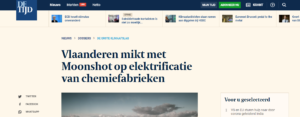Over the past four weeks, Moonshot organised a first series of industrial Advisory Boards. In these meetings, the academic consortia behind the first series of nine Moonshot projects presented preliminary research results to no less than 71 interested companies. These companies, in turn, provided the consortia with valuable input to steer their research towards maximal industrial relevance. This interactive process reflects the industry-driven approach of Moonshot and underlines the importance of cooperation in reaching the 2050 climate goals.
Industry-driven research
To make sure Moonshot research at universities and knowledge institutes will lead to an actual reduction of industrial CO2 emissions, Moonshot actively involves companies in its operations through, amongst others, industrial Advisory Boards. During these meetings, the academic consortia behind Moonshot projects present the status of their research to interested companies and share relevant results obtained thus far. Meanwhile, participating companies have the opportunity to follow up on Moonshot projects from a front-row seat, guide the research by providing industrial input, discover innovative technologies in an early stage, and identify opportunities for the future.
2019 projects
Between 11 March and 2 April, one Advisory Board meeting was set up for each of the four
Moonshot research trajectories (MOTs). All companies that signed a Moonshot Letter of Intent (LOI) were invited to participate. In this first series of meetings, preliminary research results from the
Moonshot projects from budget year 2019 were discussed. These innovative projects took off in early 2020 and have now been running for little over a year.
Active participation by 71 companies
Across the four MOTs,
no less than 71 different companies participated in the Advisory Boards. Most of these companies are situated within the broad chemical sector, with additional participants from the other sectors targeted by Moonshot, being petrochemistry, steel and energy. Moreover, companies from other sectors, VLAIO and a number of
Flemish spearhead clusters also joined the discussions.
In a spirit of
open interaction, companies formulated substantive questions and remarks concerning the presented research results. They were able to actively gauge to what extent the presented projects results could be integrated within their current or future operations. The academic consortia, meanwhile, grasped the opportunity to thoroughly assess the industrial relevance of their research and identify areas of improvement, or even opportunities for potential follow-up projects within Moonshot or beyond.
Looking ahead
Following the first Advisory Boards,
in-depth bilateral meetings between companies and consortia that wish to engage more intensively will be facilitated by Moonshot. In the fall of this year, a
second series of Advisory Board meetings will be organised. During these meetings, the 2019 projects will present their final findings. The 2020 projects, which started their work in March 2021, will also present some preliminary results. Interested companies who have not yet signed a Moonshot LOI, but wish to participate in this second series of meetings, can contact
moonshot@catalisti.be for more information.


